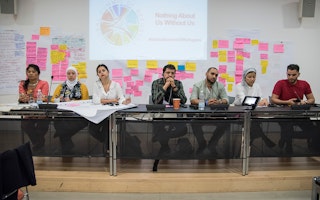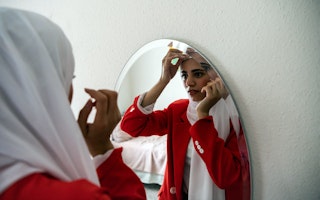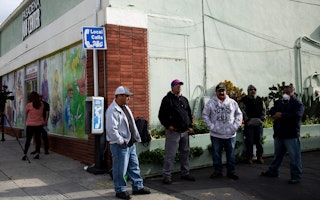A Message from Wales on Refugees: “People Are Very Keen to Help”
By Gregory Maniatis

“I can’t solve the whole Syrian crisis, but I can do something, for a few people.” The words of Olwen Thomas, from the port of Fishguard in Pembrokeshire, southwest Wales, probably sum up the feelings of many people around the world, as we follow news reports about the terrible difficulties that have faced refugee families fleeing the conflict in Syria, as well as other crises around the world.
Thomas, and other members of her community, are now doing something significant through their involvement in the Fishguard Refugee Sponsorship Group. The group was one of the first to respond to a UK scheme first announced last July by the British Home Affairs Minister Amber Rudd and the Archbishop of Canterbury Justin Welby—the leader of the Anglican Church.
Under the Community Sponsorship program, local groups agree to sponsor refugee families and help them integrate into life in the UK by assisting with things such as finding housing, securing access to medical and social services, arranging English language tuition, and supporting them towards employment and self-sufficiency.
According to BBC Wales, there are now about 13 community groups already sponsoring or looking to sponsor families across Wales. One Welsh group in the small town of Cardigan has raised £12,000 as part of its application to the scheme. Vicky Moller, a member of the group, told the BBC that groups of neighbors are “making a plan to integrate people, raising money, finding homes, welcoming them at the airport, showing them how to use the doctors and the bus.”
“There’s a huge longing by people in the area I live in to do this,” she added. “People are very, very keen to help.”
The sponsorship model being launched in towns and cities across England and Wales is partly inspired by a hugely successful effort launched in Canada in 1979, when the mayor of Ottawa, Marion Dewar, mobilized an effort by community groups to settle 4,000 mostly Southeast Asian refugees. To date, Canadian communities and citizens have resettled almost 300,000 refugees through its private sponsorship program.
Last year, the Open Society Foundations began working with the Canadian government, the UNHCR, the University of Ottawa, and the Radcliffe Foundation on the Global Refugee Sponsorship Initiative (GRSI), a project which seeks to spread the word about the Canadian experience and support countries and civil society organizations interested in adopting community sponsorship models in new jurisdictions around the world.
As the UK effort gathers momentum, GRSI is working with UK partners on a weeklong “road show”—a tour of six cities in England and Wales. Roadshow participants include Canadian and UK ministers, government officials, city mayors, civil society leaders, and refugee sponsors, each of whom will share their experiences at a series of open houses that are expected to draw over 300 representatives from interested churches and local groups.
Russel Rook of the Good Faith Partnership is one of the organizers of the roadshow. He notes that religious groups have taken an active role in the UK effort so far, just as they did in Canada, with 50 congregations from the widest possible array of denominations and networks now seeking to join the UK’s program. “The church has much to offer and everything to gain in using its resources to welcome people to a place of sanctuary and safety,” he says.
Chris Clements, a director of Social Finance UK, which is also supporting the roadshow, has noted the shortcomings of “traditional” refugee resettlement in the UK, which has left many refugee families isolated and struggling to adapt to their new surroundings. This in turn results in high rates of unemployment, depression, stress, and other problems.
Community sponsorship, Clements says, “enables local people to take responsibility for resettling a refugee family, supporting and empowering them to rebuild their lives.” Canada’s record shows how it has “improved outcomes for refugees and made communities more welcoming.”

Gregory Maniatis is a director of Programs at the Open Society Foundations.


